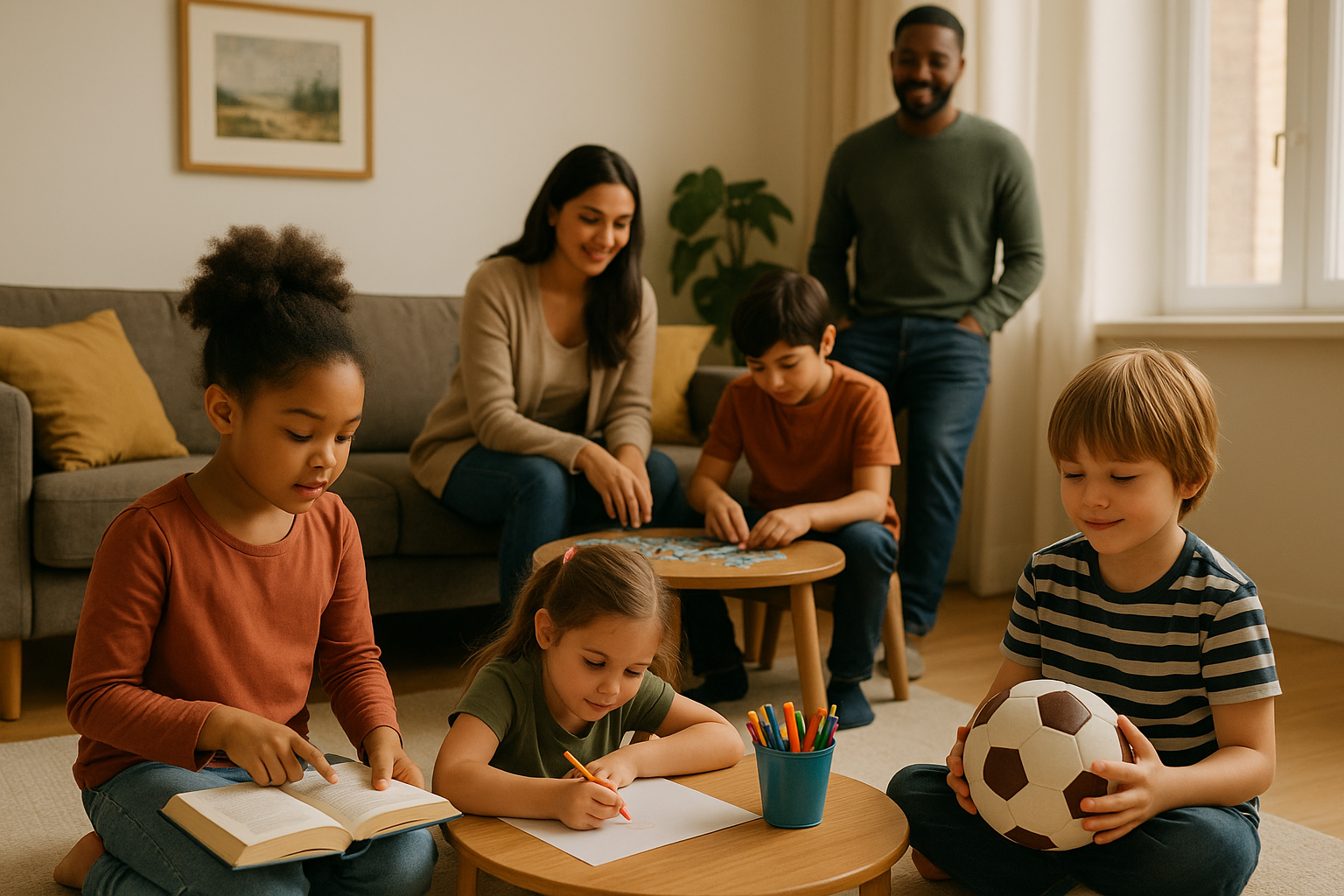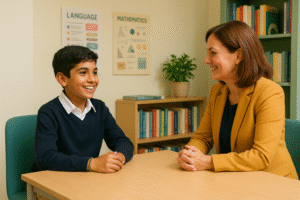
100 Things to Do When Kids Complain They Are Bored
“I’m bored, Mum!”
You’re trying to finish an important email, and there it is again, that familiar whine echoing through the house. You’ve just spent a fortune on new toys, the craft cupboard is bursting, and yet here we are. Sound familiar? That’s why I’ve created this ultimate list of things ahead of the summer holiday for when kids complain they are bored and so that screen time can be managed effectively.
I’ve been there myself as a mum, and over my 20 years in education, I’ve heard this complaint more times than I care to count. The truth is, boredom isn’t always a bad thing – it’s actually crucial for developing creativity and independence. But when you’re juggling work, household tasks, and parenting, you need practical solutions, not psychology lectures.
Let’s be honest: thinking of engaging activities on the spot when you’re already stretched thin is exhausting. That’s why I’ve compiled this comprehensive list of 100 activities that actually work. These aren’t just time-fillers; they’re opportunities for growth, learning, and genuine engagement.
Why ‘Boredom’ Isn’t Always What It Seems
Before we dive into the solutions, let’s address what’s really happening when children complain of boredom. After years of working with families, I’ve noticed that “I’m bored” often means:
- “I want your attention”
- “I feel overwhelmed by too many choices”
- “I need structure or direction”
- “I’m used to constant stimulation”
Understanding this helps us respond more effectively. Sometimes children need our presence, not just activities. Other times, they need gentle guidance to rediscover independent play.
The ‘Boredom Jar’ Solution
Here’s a strategy that’s transformed countless households: create a ‘boredom jar’. Print out activities from this list, cut them into strips, and pop them in a jar. When boredom strikes, your child can pick one out and have a go.
This approach works because:
- It removes the burden of constant decision-making from you
- Children feel empowered to solve their own problem
- It introduces an element of surprise and choice
- It prevents the endless “I don’t want to do that” responses
Activities That Actually Engage: The Complete List for When Kids Complain they are Bored
Be Useful: Building Life Skills
- Hoover and tidy your bedroom – Teaching responsibility whilst solving your problem too
- Make your mum or dad a cup of tea – A lovely gesture that builds practical skills
- Put clothes that are too small into a charity box – Decluttering with purpose (Find local charity shops)
- Organise schoolwork into folders, sharpen pencils, check pens work – Preparation that pays dividends
- Gather plastic bags for recycling – Environmental awareness in action (Find recycling points)
- Dust screens of all digital devices – Practical tech maintenance
- Check light bulbs and smoke alarms work – Safety awareness building
- Audit savings and consider earning opportunities – Financial literacy starts young (Money and Pensions Service for kids)
Creative and Artistic Pursuits
- Take a chair outside and sketch your home – Observational drawing skills
- Create a floral arrangement from garden finds – Nature-based creativity (Flower pressing guide)
- Learn to knit or crochet – Traditional skills with modern relevance (Free knitting patterns)
- Design a new superhero and illustrate their comic adventures – Storytelling through art
- Try to copy a famous painting – Art appreciation and technique practice (Famous paintings online)
- Learn calligraphy and design family place settings – Beautiful practical skill (Calligraphy basics)
- Create a family art gallery on a wall or washing line – Celebrating creativity
- Make origami pigeons – Precision and patience building (Origami instructions)
- Learn to draw a grumpy frog – Fun character drawing (Drawing tutorials)
- Turn household objects into unusual photo subjects – Creative photography
Physical Activities and Outdoor Adventures
- Practice handstands and cartwheels – Physical confidence building
- Do some garden skipping – Classic playground fun
- Rake leaves outside – Seasonal helping with exercise
- Add bird food to feeders – Wildlife care and observation (RSPB bird feeding guide)
- Create a family obstacle course – Physical challenge design
- Find a nice tree to climb – Calculated risk-taking and adventure (Tree climbing safety)
- Create a den inside or outside – Imagination and construction skills
- Learn to juggle three soft balls – Coordination and persistence (Juggling tutorial)
- Go litter-picking locally – Community service with immediate impact (Keep Britain Tidy)
- Take the dog for a walk – Responsibility and exercise combined
Learning and Discovery
- Learn to touch type – Essential digital age skill (Free typing practice)
- Research three interesting jobs – Career exploration and communication (Career profiles)
- Learn useful phrases in a new language – Global awareness building (Duolingo free app)
- Create your own weather station – Scientific observation skills (Weather watching guide)
- Learn basic first aid – Life-saving practical knowledge (British Red Cross children’s first aid)
- Research a country you know nothing about – Geographic and cultural learning (CIA World Factbook)
- Learn to identify common trees – Nature knowledge for life (Woodland Trust tree identification)
- Choose and complete a maths challenge – Problem-solving practice (NRICH maths challenges)
- Learn an unusual word daily – Vocabulary expansion (Merriam-Webster word of the day)
- Research family history and create a family tree – Heritage connection (FamilySearch free genealogy)
- Learn a poem by heart – Memory training and cultural appreciation
- Check what happened on this day in history – Historical awareness (BBC On This Day)
Technology and Digital Skills
- Create a song using GarageBand – Music production basics
- Research local digital device capabilities – Technology optimization
- Double-check social media privacy settings – Digital citizenship
- Use online maps to plan dream road trips – Geography and planning skills
- Create family photo albums or calendars – Digital organisation and memories
- Plan online family food shopping within budget – Practical maths and planning
- Research podcasts for your age group – Media literacy and discovery
- Take and edit photos of beautiful outdoor scenes – Photography and digital skills
Social and Community Connection
- Call elderly relatives with news and questions – Intergenerational connection
- Put postcards through neighbours’ doors checking they’re okay – Community care
- Bake a cake for a neighbour – Kindness in action
- Create treasure hunts for younger children – Leadership and creativity
- Write letters to care home residents – Empathy and communication
- Plan family movie nights with posters and snacks – Event organisation
- Host family meetings with real agendas – Democratic participation
- Create family Zoom quiz content – Technology for connection
- Start a book club with friends – Literature and social skills
- Teach parents useful apps or computer functions – Reverse learning
Indoor Entertainment and Games
- Dust off favourite board games – Classic family time
- Play cards with other bored household members – Social gaming
- Get binoculars for wildlife spotting – Nature observation
- Try meditation for children – Mindfulness and calm
- Create your own jokes and test them – Humour development
- Try online exercise or yoga with parents – Shared fitness
- Learn several musical instrument chords – Musical foundation building
- Complete design STEM challenges – Engineering thinking
- Do quick punctuation quizzes – Grammar skill building
- Try amazing online quizzes – Knowledge testing and fun
Food and Cooking Adventures
- Learn to make bread from scratch – Traditional skill with immediate rewards
- Research and cook homemade pizza – Culinary creativity
- Plan and prepare family meals – Nutrition and planning
- Bake treats for sharing – Generosity through cooking
Planning and Goal Setting
- Write a two-year master plan – Long-term thinking
- Research SMART goals and create personal ones – Achievement planning
- Develop family fitness regimes – Health planning
- Create curriculum vitae listing achievements – Self-reflection and preparation
- Plan visits to local attractions – Cultural exploration
- Plan geocaching adventures – Modern treasure hunting
- Design bedroom renovations in Lego or Minecraft – Creative planning
- Write daily diary entries – Reflection and memory keeping
Reading and Literature
- Read book chapters consistently – Literary development
- Check BookTrust’s 100 best children’s books – Literature exploration
- Write stories or poems for competitions – Creative writing
- Learn about Poetry by Heart competitions – Performance and memory
- Research and discuss philosophy videos – Critical thinking
Kindness and Gratitude
- Write gratitude lists and thank you postcards – Positive psychology
- Research and support chosen charities – Social consciousness
- Write about proudest achievements – Self-recognition
- Ask friends about favourite relaxation methods – Peer learning
- Research charity volunteer opportunities – Community involvement
Entertainment and Culture
- Ask family about greatest musicians and listen – Musical education
- Find best sporting moments and watch together – Shared cultural experiences
- Browse National Geographic photos of the day – Visual inspiration
- Research Time Magazine’s influential people – Current affairs awareness
- Entice parents to play your video games – Shared gaming experiences
- Check out BBC Ten Minute Arts and Crafts – Quick creative projects
Reflection and Self-Care
- Think of five favourite relaxation methods – Self-awareness building
- Reflect on news consumption habits – Media awareness
- Write poems about feelings or memories – Emotional expression
- Create playlists of family favourite songs – Musical memory making
Making It Work: Practical Implementation
Age-Appropriate Adaptation
Ages 5-8: Focus on activities 1-30, with adult supervision for cooking and outdoor activities Ages 9-12: Most activities work, with guidance for technology and social media tasks Ages 13+: Full list applies, with emphasis on independence and responsibility
Setting Up for Success
Create the right environment:
- Designate specific areas for different activities
- Keep basic supplies readily available
- Allow for mess and imperfection
- Celebrate effort over outcome
Establish clear expectations:
- Some activities are independent, others need adult input
- Not every activity will appeal to every child
- It’s okay to abandon activities that aren’t working
- The goal is engagement, not perfection
When Activities Don’t Work
If your child consistently rejects suggestions, consider:
- Are they seeking attention rather than activity?
- Do they need help starting rather than choosing?
- Are they overwhelmed by choices?
- Would they benefit from structured routine instead?
Sometimes the solution isn’t another activity – it’s connection, rest, or simply accepting that some degree of boredom is normal and healthy.
The Long-Term Benefits
These activities aren’t just boredom busters; they’re building blocks for:
- Independence and self-reliance
- Creative problem-solving skills
- Confidence in trying new things
- Understanding of contribution and responsibility
- Appreciation for simple pleasures
- Connection with family and community
Your Next Steps
Start small. Don’t try to implement everything at once. Choose 10-15 activities that appeal to your child’s interests and your family’s situation. Create your boredom jar, explain the system, and be prepared to offer gentle encouragement rather than enforcement.
Remember, the goal isn’t to eliminate boredom entirely – it’s to help children develop resources for managing it independently. Some of my most creative students have told me their best ideas came from those moments of apparent ‘nothingness’.
The Bottom Line
Boredom complaints are opportunities in disguise. They’re chances to build independence, creativity, and problem-solving skills. By providing structure and suggestions rather than constant entertainment, we’re giving children tools they’ll use throughout their lives.
Don’t feel guilty about not being your child’s constant entertainment director. You’re teaching them something far more valuable: how to find interest, purpose, and joy in the world around them.
At Academic Success, I’ve seen how these simple strategies transform family dynamics. Children become more independent, parents feel less pressured, and everyone discovers new interests and abilities.
What specific boredom challenges are you facing with your child? Every family’s situation is unique, and sometimes the best guidance comes from discussing your particular circumstances.
Reena Damani is the founder of Academic Success, with over 20 years of experience helping children aged 3-11 build strong foundations and reach their potential. She has guided hundreds of families through educational challenges and continues to support families across the UK in their learning journeys.
Related Resources:
Useful Links:
- BookTrust’s 100 Best Children’s Books
- BBC Ten Minute Arts and Crafts
- National Geographic Photo of the Day
- Philosophy Foundation Videos
- Poetry by Heart Competition
- Time Magazine’s Most Influential People
Have you tried any of these activities with your children? I’d love to hear about your experiences and any creative adaptations you’ve discovered. Share your stories in the comments below – they might inspire other families facing similar challenges.



